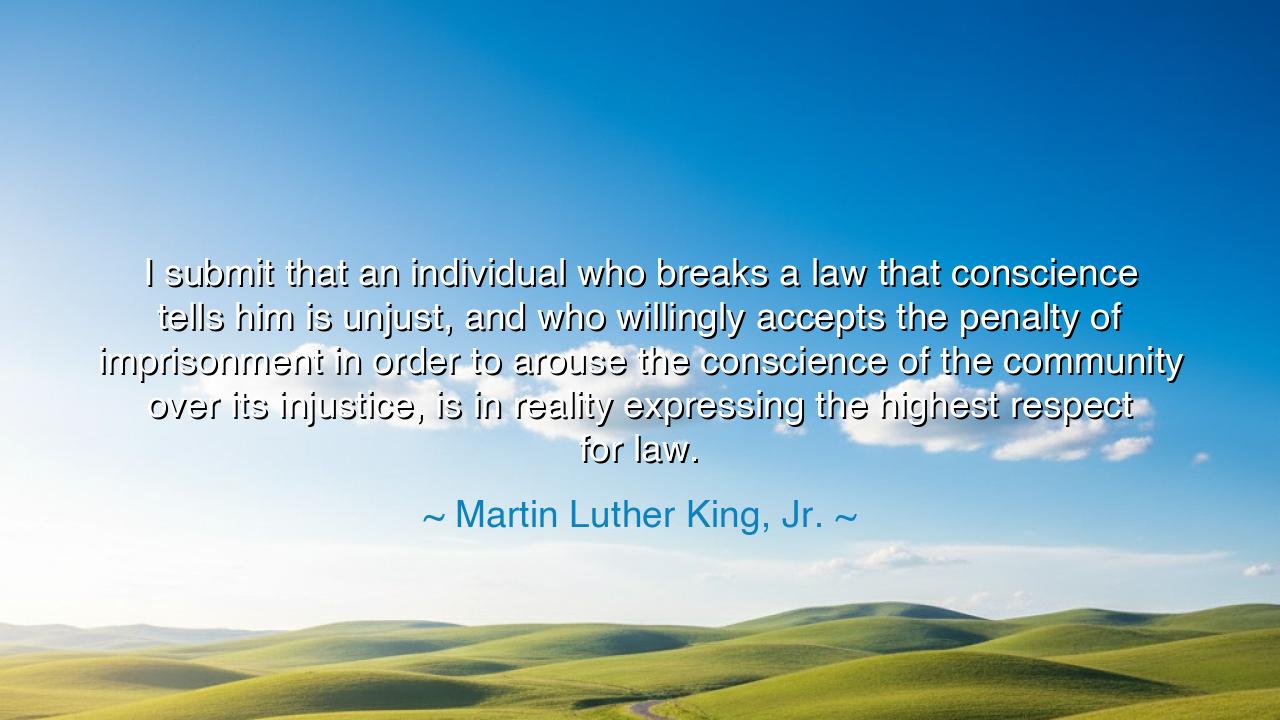
I submit that an individual who breaks a law that conscience
I submit that an individual who breaks a law that conscience tells him is unjust, and who willingly accepts the penalty of imprisonment in order to arouse the conscience of the community over its injustice, is in reality expressing the highest respect for law.






Hear the immortal words of Martin Luther King, Jr., spoken from the depths of struggle and faith: “I submit that an individual who breaks a law that conscience tells him is unjust, and who willingly accepts the penalty of imprisonment in order to arouse the conscience of the community over its injustice, is in reality expressing the highest respect for law.” This is no call to rebellion without restraint, no license for chaos, but a sacred teaching on the nature of justice and the true purpose of law. For King reminds us that the law, when corrupted, may lose its righteousness, but the heart guided by conscience can redeem it through sacrifice.
The meaning of this saying lies in the paradox that to honor law most deeply, one may be compelled to resist it. Laws that uphold segregation, oppression, or cruelty are not law in the highest sense; they are but instruments of tyranny cloaked in legality. When a man disobeys such laws, not with hatred but with reverence for truth, and when he bears the punishment not with bitterness but with courage, he unmasks the falsehood of those laws. His suffering becomes a mirror in which society must see its injustice. This act is not contempt for law, but the very opposite—it is the pursuit of law in its truest form, which is justice.
The origin of this teaching comes from King’s “Letter from Birmingham Jail” in 1963, written while he languished in a narrow cell for leading nonviolent protests against segregation. Critics had called him a lawbreaker, a disturber of the peace. But King, with the clarity of a prophet, declared that there are two kinds of law: just and unjust. To obey the unjust without protest is to betray the higher law of conscience. To resist the unjust, even at the cost of one’s freedom, is to honor the deeper spirit of law, which seeks to uphold the dignity of every soul.
History abounds with examples of this truth. Recall the story of Socrates, who, though condemned unjustly by Athens, refused to flee into exile. He drank the hemlock, not because the law was just, but because he wished to awaken the city to its corruption. Or consider the life of Mahatma Gandhi, who broke the laws of empire by leading salt marches and acts of civil disobedience. He accepted imprisonment with serenity, using his chains to rouse the conscience of India and the world. King walked in this lineage, showing that prison cells can become pulpits, and that chains can speak more loudly than speeches.
The teaching also carries a warning: obedience alone is not virtue. A people who follow every law without question may find themselves complicit in great evil, as history has shown in times of dictatorship and war. True virtue lies in discerning when law departs from justice, and in having the courage to resist with humility and sacrifice. For it is easy to shout against injustice when one is safe; it is harder to endure imprisonment or ridicule with patience. King’s wisdom calls us not to reckless defiance, but to deliberate, conscience-driven action, crowned with the willingness to bear the cost.
The lesson is thus: if you would honor law, do not bow blindly to every decree. Examine it in the light of conscience. If it is just, obey it with vigor. If it is unjust, resist it with courage—but let your resistance be clothed in love, not hatred, and let your sacrifice awaken the hearts of others. For in so doing, you do not destroy law; you purify it. You call it back to its rightful purpose: the protection of justice, the service of truth, the dignity of the human soul.
Practical action is within reach of every generation. Stand against laws and customs that degrade others, even if it costs you comfort. Support movements that seek justice with peace, not violence. Teach your children that law is not a chain to be worn unthinkingly, but a covenant to be honored when it is righteous and corrected when it is false. And above all, cultivate courage in your heart, for without courage, conscience remains silent, and injustice reigns unchallenged.
So let King’s words resound as a timeless command: to disobey unjust laws with conscience, and to suffer willingly for the sake of truth, is the highest respect for law. It is the path of prophets and reformers, of martyrs and liberators. And if you would walk this path, you too may help turn the tide of nations, until justice rolls down like waters, and righteousness like a mighty stream.






AAdministratorAdministrator
Welcome, honored guests. Please leave a comment, we will respond soon